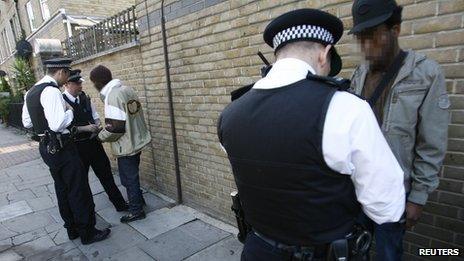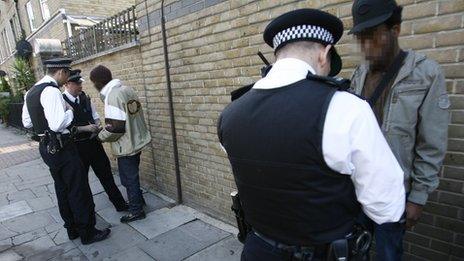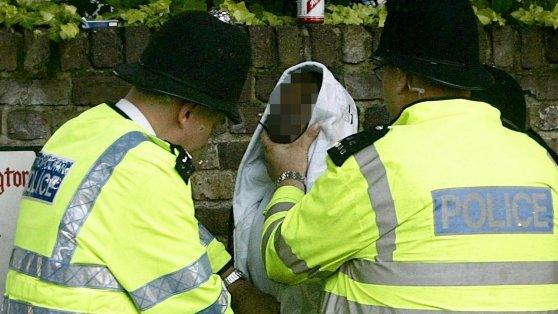'Regressive attitudes' hold up stop and search changes
- Published
Metropolitan Police commissioner Sir Bernard Hogan-Howe: "Over the last two years in the Met we have reduced stop search by over a third''
Plans to limit police stop and search powers in England and Wales have been held up by "regressive" attitudes in Downing Street, senior Conservatives have told BBC Newsnight.
The home secretary wrote to cabinet colleagues in December seeking approval to "reduce significantly" one type of stop and search, Newsnight has learned.
Despite setting a 12 December deadline, the changes are yet to be announced.
Downing Street said the prime minister accepted reforms needed to take place.
However, officials have refused to say when any decisions might be taken.
Critics say stop and search unfairly targets the black community.
In November, the Equality and Human Rights Commission said that, overall, black people were six times more likely than white people to be stopped, with Asian or other ethnic minority groups two times more likely to be stopped.
One man told Newsnight's Laura Kuenssberg he had been stopped and searched by police ''at least 100 times''
On 4 December, Home Secretary Theresa May wrote seeking approval from the cabinet's home affairs committee to a "package of measures".
This included a plan to "amend section 60 of the Criminal Justice and Public Order Act 1994 so that the test for the power's use is 'necessary' and 'expedient', (to prevent incidents involving serious violence)".
'Lack of will'
Under Section 60, police can stop and search someone for weapons in a designated area, for a specific time, without suspicion that the individual is involved in wrongdoing.
However, a senior officer must hold a reasonable belief that violence has happened or may occur in the area.
Mrs May told cabinet colleagues she intended to "raise the level of authorisation to a senior officer who must reasonably believe that violence 'will' take place (as opposed to 'may')".
She continued: "I expect this to reduce significantly the number of stop and searches under section 60. Section 60 is only one kind of stop and search."
One minister told Newsnight's chief correspondent Laura Kuenssberg that "we all want to get on" with the changes.
But sources told her they feared "there's just a lack of will, a fear of looking soft on crime".
'Despise' police
The Liberal Democrats agree with the proposals and Labour has offered cross party talks to push the policy forward.
Shadow home secretary Yvette Cooper said: "Instead of internal rows over this, Theresa May should accept our offer to work together to change stop and search."
The prime minister's former adviser on youth and crime, Shaun Bailey, said: "Not getting stop and search right, certainly in urban communities, would be very dangerous because I believe it breeds criminals.
"If I was talking to someone in government I'd say: 'Take the brave pill, you'll be rewarded for taking the brave pill and reforming stop and search'."

Critics say the powers unfairly target ethnic minorities
He added: "There's many communities up and down the country who are divorced from politics and feel that the forces-that-be don't represent them and don't care about them. This would be a massive message in the right direction."
While filming in Brixton, south London, Newsnight spoke to a teenager who said he had been stopped and searched as an 11 year-old.
"Since then I've despised them [the police] more and more because for me they are like criminals in fancy dress," he said. "They've got such a big mob mentality."
Another young man said he had been stopped and searched by the police "over 100 times" because he was "in a black neighbourhood" where the police "think everyone is a drug dealer".
'Important power'
Metropolitan Police Commissioner Sir Bernard Hogan-Howe agreed that random stop and search powers had created distrust between some communities and the police in London.
He said over the last two years the Met had reduced the number of stop and searches by over a third, while doubling the number of arrests to one in five.
"We employ human beings, they make mistakes and when we make a mistake - particularly with someone who's innocent of any crime, and frankly never will be guilty of any crime - we leave a really bad imprint on that child, on that family, so it's important we get it right.
"But I think it's an important power, that used wisely, is really effective."
- Published8 January 2014
- Published11 November 2013

- Published2 July 2013
